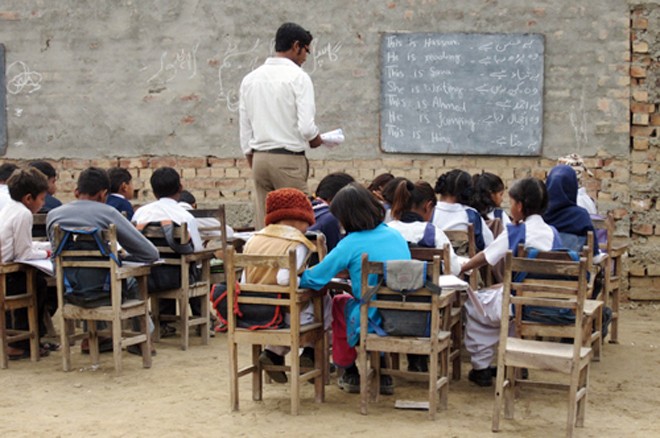
The people of Pakistan are eager to improve the lives of their fellow citizens investing in the education and health sectors

Shahnaz would have died of kidney failure three years ago. Getting dialysis every alternate day at the Sindh Institute of Urology and Transplantation (SIUT) is keeping her alive. The 38 years old mother of three does not have enough resources to continue her treatment. It would cost about Rs40 thousand a month at a private hospital. But SIUT is taking care of her.
Arfaa, 13, is one of the four children of a fisherman, who ekes out a living at an impoverished quarter near Ibrahim Hyderi in Karachi. Her father has managed to get her admitted to a school run by The Citizens Foundation (TCF). She plans to become a doctor when she grows up. The TCF has simply changed the way she used to perceive her life, opening up a range of possibilities for the 13 year old girl.
When it comes to paying taxes, Pakistanis act stubborn by all estimates. As the country’s tax-to-GDP ratio explains: it stands at around 10 per cent. But Pakistan is among a few developing countries in the world with organisations like SIUT and TCF, one working in the health sector while the other in the education sector -- thriving on donations from the general public.
Although there are no comprehensive figures, in 2012, the Pakistan Center of Philanthropy (PCP) published a survey in which it was noted that 70 per cent of the charity funds donated were given to the health and education sectors both by corporate sector and individuals in the country. This shows that the people of Pakistan are eager to improve the lives of their fellow citizens investing in these two important sectors.
Faisal Edhi, the head of one of country’s largest charity networks, the Edhi Foundation, explains this phenomena. He says: "people who have money also have common sense; they know the state of public education in the country and the way government hospitals treat patients, so they choose to focus on these two sectors." He further says, "Providing quality education means securing the future of our children and healthcare is this country is by far the most expensive essential services. So it makes total sense."
But can the billions of money given to institutions change the fortunes of the country in the long run? Perhaps to an extent but private donations and non-governmental institutes cannot replace the state, argue social activists.
In a conservative society like Pakistan, people take charity as part of their religious duty and handsomely give each year. But what bothers many social activists is the generally informal ways in which it is spent. They argue that the amount that is involved should be spent wisely, and that can only be done if the government moves to institutionalise charity-giving mechanism.
"A lot of people are eager to work in the social sector, but they don’t have the funds," says Karamat Ali, a veteran social activist and director at Pakistan Institute of Labour Education and Research (PILER). "If the government collects development funds and grants them to sincere activists, things can improve very fast in the country."
Ali notes that the government has included Article 25-A in the Constitution which promises basic education to every child. So, the state cannot rely on private donors to take care of every child. However, given the lack of resources and red tape in government-run departments, the state can develop public-private partnerships and help turn around schools and hospitals that are dysfunctional.
Annually, the people of Pakistan donate enough money to run each and every NGO in the country. If the government collects and gives it to development organisations, local NGOs won’t have to rely on foreign funding. "But again, that does not spare the government of its responsibilities," he adds.
Read also: The religion factor in giving charity
Sanaullah Kazi, a veteran educationist, runs a state-of-the-art school in Surjani Town, one of Karachi’s poor neighbourhoods. He says that people in the area are eager to send their children to school but there are no quality schools in the neighbourhood. "We are trying to provide children with the best education possible for least amount of fees, as parents in the neighbourhood are not well-off."
Such efforts, Ali points out, are helping people, but individuals cannot be tasked with the responsibilities to cater to the whole populace. "What is important is the involvement of the state in such matters," he says.
Kazi, however, believes that private hands are good enough to run the institutions and balks at the idea of the government’s involvement, as that would mean more formalities and bureaucracy.
Globally, developmental funds in a country are overseen by governments. And in Pakistan, one has to be more careful, as banned militant organisations have often taken advantage of religious donors. But Kazi argues that the government’s mechanism is replete with corrupt officials and workers, who do not spare even non-profit ventures like his own when it comes to bribery.
Ali understands the thorny ways the government works but insists that to channelise funds worth billions of rupees, a macro and all-encompassing approach is needed if we are to make anything meaningful out of philanthropy. And that requires the government’s involvement at some level. "We have to democratise the system and avoid bureaucracy. That’s the way forward."
However, with or without the government’s involvement, the people of Pakistan are always there to help. So, as long as the people continue to give, the likes of Shahnaz and Arfaa would continue to benefit from philanthropy while on the fringes the debate over the role of state is also likely to continue.